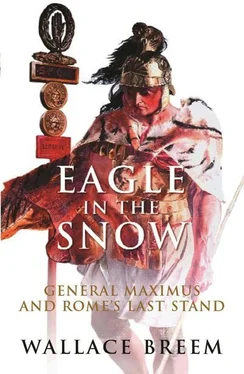“I stayed there a long time. I was very ill, very weak, and very tired. Also, the hand that I had lost hurt me a great deal. The city was like all sacked cities; a place unclean and full of horror. The Bishop was kind, and I stayed on, for I had nowhere else to go. I had no purpose. I had nothing. What else was there for me to do?
“The barbarians devastated Gaul, and the provinces never recovered. They burned and sacked city after city, and made for the south; for that land of sun which was barred to them by high mountains that they could not cross.
“That summer when I was stronger, we had news that Constantinus had crossed to Gaul. He came to Treverorum, and I watched him ride through the streets with his men—the sweepings of the old Sixth and Second—on his way to the south. His son, Constans, was at his side. He had not changed. He rode with a swagger and his chin up, and I remembered there had been a time when he had offered his sword to another man. His father, plump and smiling, made promises, and the people shouted for him. But one man cried out, ‘You should have come before and helped Maximus who is dead.’ I shrank back against the wall when I heard that name, and pulled my hood about my face. Maximus had been a general, Dux Moguntiacensis, and Legate of the Twentieth. What was Maximus to me, who did not even own the cloak upon my back?
“I watched the young Constans ride out in the summer sun to his great adventure. And I wished him luck. He would need all the favours that the Gods could bestow, and even then he would still end as Maximus had ended.
“In the late autumn I borrowed a horse and I rode out through the great gate that ghosts had once named Romulus, and down the road to Moguntiacum—that road to nowhere. I stopped at the thirtieth milestone, where the road forked right and left, and looked at the ruins of my past. The bleached bones of my dead lay where they had fallen, but there was no message for me there, in that long grass among the broken spears, the rusted sword hilts and the smashed helms. I saw crows perched on a fragment of splintered paling, while a field mouse ran up and down the scorched pole of a burnt-out waggon. I poked at an overturned brazier, but it had been used as a nest and was full of dried grass. It meant nothing to me now. The ditches had been carelessly filled in, and the raw earth was covered with green weeds. A light wind ruffled the long grass, but that was all.
“No voices spoke; no-one cried out and reproached me for what I had done, nor for what I had failed to do. I looked at the sun, warm and friendly in a blue sky, and I prayed that Quintus’ dream had come true, and that he now drove the horses he had so long desired.
“They say that if you listen long enough, and have the gift, you may hear the sounds of the past, which never die. I do not know if that is so, but as I left that desolate and ghastly place, it seemed to me that I heard the faint sound of voices that cried, ‘Maximus, Maximus,’ as though in acclamation. Yet when I looked behind me, I could see nothing but the bowed grass, and hear nothing but the plaintive cry of a kestrel, gliding before the wind.
“I returned to the city, and I was empty with pain. I went up the stairs in Romulus to that room where I had once stood and made plans, and held false dreams of the Purple. I remember that I sat beside the window, and I put my head in my hands; and I wept. And then the Bishop came and touched my shoulder. He did not know what to say.
“I cried out then: ‘I do not know what to do? I should have died out there with my men. Oh, Mithras, God of the Sun, why did you not let me die?’
“The Bishop held out his hand, and in it was a sword that I recognised.
“‘It is yours.’ he said. ‘It was left for you by the man who brought you to my house. Do what you wish, Maximus. Stay here; I shall not ask questions. I have neither thanked you nor cursed you for what you did. It is not for me to judge, and I shall not do so.’
“I looked at him in despair; but even I could see that he looked ill. He, too, had suffered through my failure.
“I stayed. What else was there to do?
“He was more sick than I realised and, before the winter came, Mauritius, Bishop of Treverorum was dead; and I was more lonely than ever.
“In the spring, a new Praefectus Praetorio arrived, sent by Honorius to investigate the damage that had been done. It was a difficult time. There was war in the south; Constantinus was manœuvering against the imperial troops; and the land was still full of plundering bands who had deserted the main body of their tribe.” Maximus paused. He said, contemptuously, “But the first thing they asked the council for—was chariot races to amuse the people. Nothing had changed, you see.
“Later, I heard that Stilicho had fallen. The intrigues of a court eunuch succeeded where barbarian soldiers had failed. He could have fought back, but he did not wish for civil war. Unjustly condemned by the emperor he had served so faithfully, he walked to his execution with free hands.
“Then I grew restless, and I thought, why not? I have nothing to lose? I will go to Rome. I am an old man. No-one will harm me. That, at least, is one ambition I can fulfil without hurt to any man. I took a little of the money that the Bishop had left me, and I went; but I was too late. The country-side was filled with waggons and people, fleeing as though before an invading army. I knew the signs so well.”
Maximus paused, and laughed quietly. “I stood on the road, a mile away—think of that—only a mile from the Aurelian gate, and I watched Rome burn as Alaric and his Goths sacked the city after their fashion. I watched his hordes straggle up the road with their booty, and I saw a frightened woman upon a horse, her ankles tied beneath its belly, who was their prisoner. It was Galla Placidia, but I did not help her. Honorius would not have cared; and I had no wish to be a slave.
“I turned and made my way back to Gaul, and on my way I met a courier in the imperial service, taking a rescript to the government of my old island. It was a long and hazardous journey, and he had little stomach for the task. He offered me gold to take it for him. I agreed. I carried the letter in the end of my sleeve, pinned over my damaged wrist, for safety, you understand.
“So I came back, and I went to Londinium, and I found a man who called himself governor of that city. ‘Well,’ I said. ‘You may choose as many emperors as you please. Honorius has freed you at last. You must look to yourselves now—if you can.’ Then I went north and found Saturninus, and I broke his heart with the news of his son. He asked me to stay and, if Fabianus had been alive, I would have done so. But he is dead, and I could not. So—I came back here to Segontium where it all began.”
Maximus stood up. “I have kept you awake when you should have slept. You are safe enough here in your cold mountains.”
The chief of his listeners rose and faced him. He was a tall man with cold eyes and a beaked nose. He said, “We do not always sleep. Somewhere we shall find others who are like ourselves. And somewhere there will be a man with a sword, who has a purpose as you had.”
“He may be hard to find.”
“We shall find him.”
“You are quite certain.”
“Yes,” said the tall man. “Quite certain.”
Maximus said, “They have no tombstones. Not one man in Treverorum wept for their passing.” He looked at his audience in turn and smiled. “In the name of Mithras, my Master, may the Gods be kind to you on your journey.”
“And you?” asked the tall man.
“I, also, have a journey to make.”
“Where do you go?”
“To the Gods of the Shades.”
The tall man nodded. He said, formally, “Then may you live in God.”
Читать дальше












